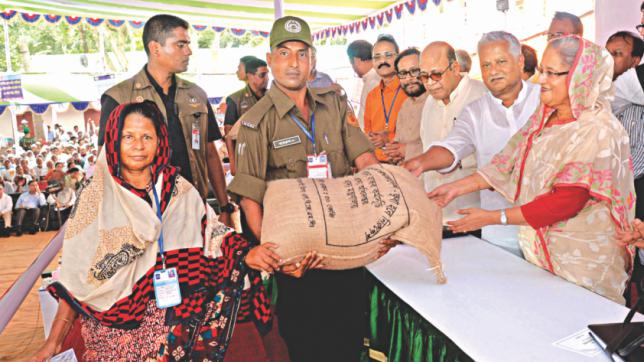
The food ministry says imported Brazilian wheat is fit for human consumption”.
The Bangladesh Council of Scientific and Industrial Research (BCSIR) has found the imported Brazilian wheat substandard, raising questions about the results of the tests carried out by the food ministry.
“All the supplied samples contained higher amount of shrunken and broken kernels than the required specification,” said the state-run agency in its test report submitted to the ministry on Sunday.
The test results came a couple of days after the food ministry said the wheat was found “within the quality parameters or within specification of contract”.
Meanwhile, a writ petition was filed with the High Court yesterday challenging the legality of the import and distribution of the “substandard” wheat from Brazil.
The ministry last week conducted the test in its labs after collecting samples of the wheat from district storages in the face of media reports on the import of two lakh tonnes of “substandard” wheat.
Two contractors — Netherlands-based Glencore Grain and Singapore-based Olam International — supplied the grains to the food directorate earlier this year.
Glencore had supplied 1.5 lakh tonnes and Olam 50,000 tonnes of wheat.
The import cost of the wheat was around $46 million or Tk 355 crore, and 90 percent of the payment had been made, said food ministry officials.
Insiders said the wheat was accepted although the suppliers failed to provide the crops’ year certificate and the Certificate of Standard and Quality of Wheat, issued either by Brazil’s agriculture ministry or chamber of commerce.
The suppliers provided certificates issued by a pre-shipment inspection company — SGS, said Ilahi Dad Khan, procurement director of the Directorate General of Food.
Insiders said the quality of the wheat was not good enough but the food directorate accepted the cereal as it fulfilled the contract specification.
The wheat was used in the government’s various safety net schemes, such as the Food for Work and the Open Market Sales, and as rations given out to law enforcement agencies.
The police administration later complained of low quality grain, prompting the food ministry to collect samples from district storages for testing.
In the tests involving 30 samples, the ministry found the quality parameters within the specification and said the samples of wheat were “storable and fit for distribution”.
However, the food directorate’s lab detected live insects and pests in samples sent from Bogra, Joypurhat, Magura, Patuakhali, Sirajganj and Sherpur.
As questions were raised about the objectivity of the tests at the food ministry’s lab, the ministry sent 14 samples of the imported wheat to the BCSIR on June 25 for testing eight parameters.
The ministry also sent samples to the Institute of Nutrition and Food Science (INFS) of the University of Dhaka for testing protein content. The protein content was found within the specification at both the BCSIR and the INFS.
But the BCSIR’s Institute of Food Science and Technology (IFST) detected the presence of shrunken and damaged kernels between 9.93 percent and 21.11 percent.
As per government rules, a supply faces rejection if the level of shrunken and damaged kernels is above 8 percent.
The damage percentage is also higher in all samples except the ones collected from Kurigram, Gaibandha and Sirajganj, said the BCSIR test report.
Neither the food directorate nor the BCSIR, however, has conducted any toxicity test to see whether the wheat is fit for human consumption although the food ministry claims that it did not find any grain “unfit for human consumption”.
Zahurul Haque, head of the IFST, said, “We tested eight parameters in line with the requirement of the food ministry. We did not conduct tests to find whether the wheat is fit for human consumption.”
He said toxicity test was needed to see if the wheat was edible.
Contacted, Food Minister Qamrul Islam, at first, handed over the phone to Ilahi Dad Khan.
On the issue of higher percentage of shrunken and broken kernels in wheat, Khan said the differences in test results between the food directorate and the BCSIR arise from the difference in test methods the two agencies follow.
Asked why the toxicity test was not conducted, the food minister said the wheat was imported in line with the quality parameters or specifications followed by the government.
“The government imports wheat based on set specification. Why do we need to go for toxicity test?” he asked.
“Why do we need to test the toxicity if protein and moisture contents remain okay?”
WRIT PETITION FILED WITH HC
A writ petition was filed with the High Court yesterday challenging the legality of the import and distribution of the “substandard” wheat from Brazil.
Pabel Mia, a lawyer of the Dhaka Judges’ Court, moved the petition seeking an order from the High Court on the Anti-Corruption Commission to initiate an inquiry into the import.
The petitioner requested the court to issue a rule upon the government to explain why the import and supply of such wheat should not be declared illegal.
Source: The Daily Star









